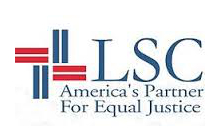Landlords and Legal Aid Can Collaborate for Housing Stability, LSC Brief Shows
 The Legal Services Corporation (LSC) released a new research brief titled, Beyond Eviction: Landlords as Essential Partners in Housing Stability. It explores critical factors in eviction cases—including economic realities, timing and long-term consequences of eviction records—and the impact of these factors on both landlords and tenants.
The Legal Services Corporation (LSC) released a new research brief titled, Beyond Eviction: Landlords as Essential Partners in Housing Stability. It explores critical factors in eviction cases—including economic realities, timing and long-term consequences of eviction records—and the impact of these factors on both landlords and tenants.
Landlords provide a critical resource: over 45 million U.S. households are renters, making up one-third of all occupied residences. Drawing on research, case examples and promising practices, this new brief illustrates how collaboration with civil legal aid and other community partners helps landlords avoid eviction, preserve rental income and strengthen their communities in the process.
Key takeaways of this brief include:
- Most eviction filings involve rent-burdened households—people paying over 30% of their income toward housing. More than one-quarter of all rental units in the U.S. are owned by small, “mom-and-pop” landlords who often rely on timely rent to cover expenses. These factors together create a fragile balance.
- Despite common perceptions, eviction proceedings rarely result in landlords recovering all rent owed. In fact, filing for eviction is likely to lead to prolonged income loss, greater administrative burdens and additional costs for future tenants.
- By working together, landlords and legal aid providers can reduce financial losses, improve stability for all parties and minimize the costs and disruptions of eviction.
- When a case does end up in eviction court, legal representation for tenants benefits both parties, as well as the court system. Legal counsel helps to streamline the process, leading to quicker resolutions where all parties understand their obligations.
The brief also highlights partnership strategies that are helping landlords and civil legal aid collaborate to create less contentious paths to stable revenue and build healthier communities. These efforts include things like providing pre-filing notices, rental assistance programs, and eviction diversion and prevention programs.
“Beyond Eviction: Landlords as Essential Partners in Housing Stability” is one of several briefs produced as part of a congressionally directed study led by LSC to examine unmet legal needs surrounding eviction in the United States. A forthcoming final report will serve as the culmination of the study. Each year, more than one in three renter households experiences a housing-related civil legal issue—such as eviction—underscoring the importance of this research. For more information and to view the full series of products from this initiative, visit: https://www.lsc.gov/eviction.
Legal Services Corporation (LSC) is an independent nonprofit established by Congress in 1974. For more than 50 years, LSC has provided financial support for civil legal aid to low-income Americans. The Corporation currently provides funding to 130 independent nonprofit legal aid programs in every state, the District of Columbia, and U.S. territories.